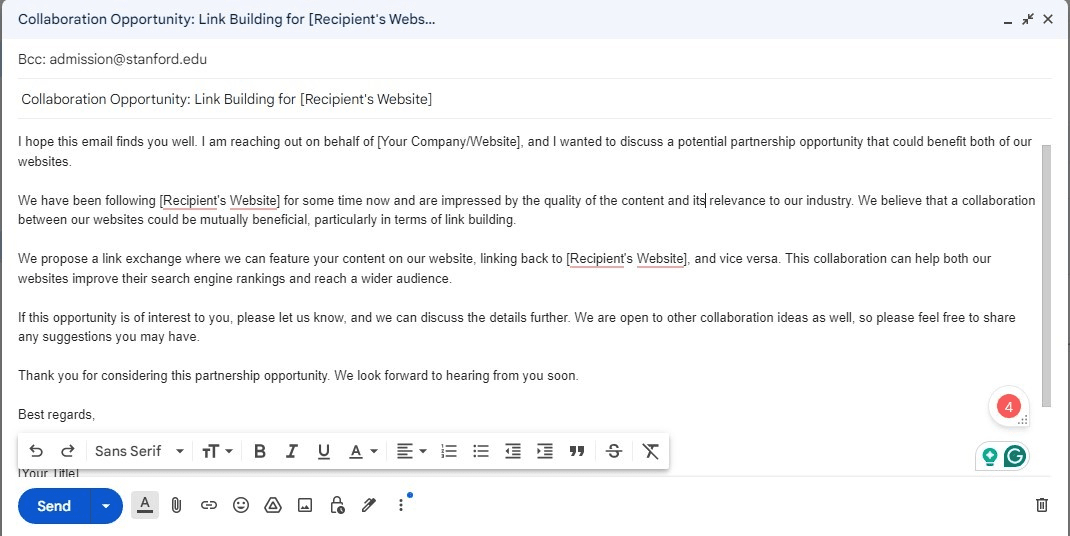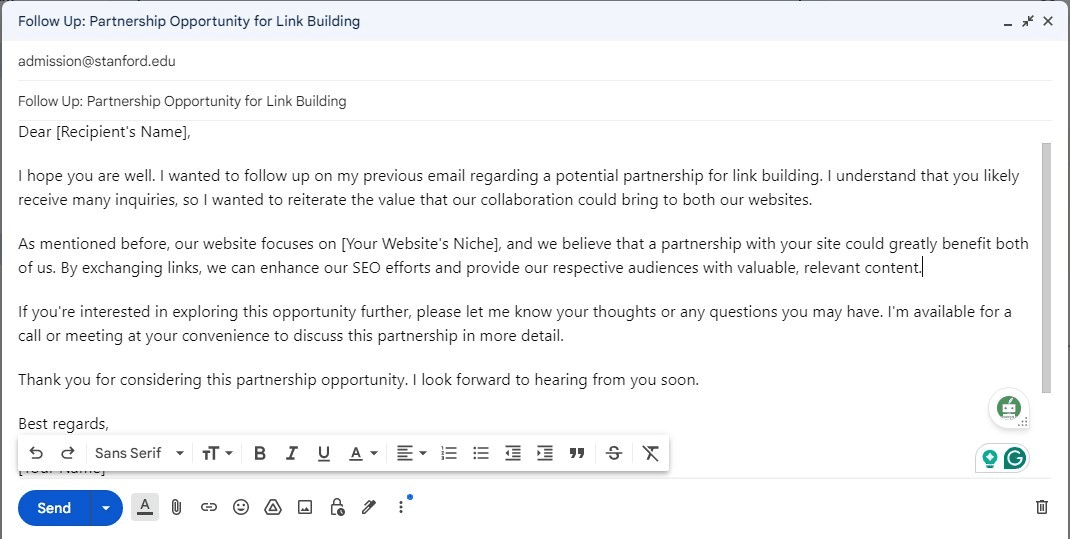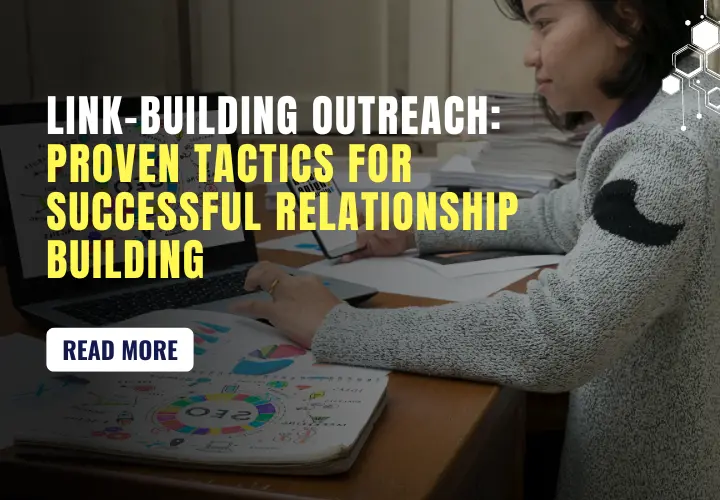Link-Building Outreach: Proven Tactics for Successful Relationship Building
Building quality backlinks is crucial for boosting your website’s search engine rankings and driving more organic traffic. However, it’s not just about acquiring links; it’s about building real relationships with other website owners, bloggers, and influencers in your industry.
In this blog, we will explore proven tactics for effective link-building outreach, and you will also learn how to find the right prospects, craft compelling outreach emails, and build long-lasting relationships.
What is Link-Building?
Link building is the practice of acquiring hyperlinks from other websites to your own site. These links are essential for improving your website’s visibility, authority, and search engine rankings.
Backlinks
These are incoming links from other websites pointing to your site. They act as votes of confidence and signal to search engines that your content is valuable and trustworthy.
Anchor Text
Anchor text is the visible, clickable text in a hyperlink. Descriptive anchor text related to your target keywords can positively impact your rankings.
Link Relevance
Links from websites that are topically relevant to your content hold more weight and value compared to irrelevant links.
Link Authority
Links from high-authority, reputable websites carry more weight than links from low-quality sites. Popular metrics like Domain Authority (DA) and Page Authority (PA) measure a site’s authority.
Major link-building strategies
Conduct Targeted Outreach and Make a Pitch
Reaching out to appropriate websites to request a link to your website is known as outreach.
Outreach is a component of most link-building strategies. Make sure your pitch includes a compelling argument for linking to your content.
Be specific before sending out your pitch, as your outreach efforts might not be successful if you do not provide a compelling reason for people to link to you.
Identify Broken Links and Suggest Replacements
Finding broken external links on other websites and providing a substitute link from your own is known as “broken link building.”
This is effective since broken links distract from a bad user experience. That is why no one wants them on their website.
Request Links from Publishers for Your Unlinked Brand Mentions
When websites reference your brand name without providing a link to your website, this is known as an unlinked brand mention.
Evaluate the Backlinks of Your Competitors
You can find out which content types in your industry typically draw the most backlinks by analyzing your competitors’ backlink profiles.
Which of your rivals’ listicle posts generate backlinks? How-to guides? Opinion pieces? With this knowledge, you can produce content that is similar to your website and, hopefully, gain backlinks.
Use HARO to Address Requests from Journalists
Another strategy for constructing high-quality backlinks to your website is to use HARO (Help a Reporter Out). HARO connects journalists with industry experts.
For their articles, journalists frequently seek the opinion of experts. If they mention you, there is a good chance they will include a link to your website.
Get the Attention of Publishers through Digital PR
Digital PR aims to raise brand awareness online through digital means.
It is a broad field that includes some of the other link-building tactics, like HARO and linkable asset creation, that we cover in this list.
Examples of Digital PR include:
- Sending journalists press releases about your business.
- Establishing connections with online journalists or bloggers.
- Taking part in marketing through influencers.
Establish Links to Assets
Content that naturally builds backlinks is referred to as a linkable asset.
For examples:
- Infographics
- Original research and data studies
- Free tools
- In-depth instructions and guides
Interesting and engaging content usually naturally generates links.
Applying outreach strategies for link-building
Identify relevant websites and influencers
Make a list of influential people and websites that are relevant to your field and have a strong online presence.
Seek out influencers who actively interact with their audience and websites that regularly provide links to other resources.
Craft personalized outreach messages
Spend some time crafting individualized messages instead of using pre-made templates when corresponding with possible link partners.
Give specific examples of their published articles or content, and describe how your website or content can benefit their readership.
Provide a compelling reason to link
Explain in detail the advantages of having a link to your content or website. Emphasize the special information, facts, or resources you have to offer that are difficult to find elsewhere.
Another way to attract possible link partners is by offering an exclusive discount or offer.
Follow Up Strategically
Outreach emails frequently go unnoticed or unanswered. After a reasonable amount of time, follow up with a kind and brief message that highlights the value you can offer.
What is Link Building Outreach?
Link-building outreach is the process of reaching out to other website owners, bloggers, or influencers in your industry to request a backlink to your site.
The goal is to build high-quality, relevant backlinks that can improve your search engine rankings and drive more organic traffic.
- Identifying Prospects: Find websites, blogs, or online platforms that are relevant to your niche or industry, and have the potential to link back to your content.
- Personalized Outreach: Crafting personalized emails or messages that resonate with the prospect rather than using generic templates or spam tactics.
- Offering Value: Providing value to the prospect, such as sharing your expertise and offering to create guest content.
- Building Relationships: Treat link-building outreach as an opportunity to build genuine relationships and connections within your industry.
Importance of Effective Link-Building Outreach
Search Engine Optimization (SEO) Benefits
- Relevant and High-Quality Backlinks
Search engines like Google use backlinks as a crucial ranking factor when determining a website’s authority and relevance.
By acquiring high-quality backlinks from reputable and relevant sites, you signal to search engines that your content is valuable and trustworthy.
- Improved Organic Traffic
Higher search engine rankings translate into increased organic traffic, which means more potential customers discover your website through their searches.
With effective link-building outreach, you can drive targeted, relevant visitors to your site.
Brand Awareness and Credibility
- Increased Exposure
By building relationships with influential websites and industry leaders through link-building outreach, you gain exposure to their audiences.
This increased visibility can help raise awareness of your brand and position you as an authority in your niche.
- Established Industry Authority
When reputable and authoritative websites link to your content, it serves as a vote of confidence in your expertise and the quality of your work.
This can help establish your brand as a credible and trustworthy resource within your industry.
Competitive Advantage
- Outranking Competitors
By consistently pursuing effective link-building outreach and acquiring high-quality backlinks, you can outrank your competitors in search engine results pages (SERPs), giving you a significant competitive advantage.
- Diversified Backlink Profile
A diverse and natural backlink profile is essential for maintaining good search engine rankings.
Effective outreach allows you to acquire backlinks from a variety of relevant sources rather than relying on a limited set of link types.
- Long-Term SEO Success
By prioritizing effective outreach and relationship building, you can ensure long-term SEO success and sustainable online growth for your business or website.
Top Effective Outreach Strategies
When it comes to link building, effective outreach is key to establishing meaningful relationships and earning high-quality backlinks.
Here are some top strategies to consider:
Personalized and Targeted Outreach

- Define Your Target Audience
Identify the types of websites, blogs, or influencers that are most relevant to your niche or industry.
This targeted approach ensures your outreach efforts are focused on the right audience, increasing your chances of success.
- Thorough Research and Preparation
Before reaching out, take the time to thoroughly research each prospect. Understand their content, audience, and the type of backlinks they typically provide.
This preparation allows you to craft a more personalized and compelling outreach message.
- Craft Personalized Pitches
Generic, one-size-fits-all outreach messages are often ineffective and can come across as spammy.
Instead, craft personalized pitches that demonstrate your familiarity with the prospect’s work and align with their content and audience interests.
Providing Value and Building Relationships
- Focus on Adding Value
Successful outreach is not just about asking for backlinks; it’s about providing value to the prospect.
Offer to contribute high-quality guest content, share your expertise, or suggest mutually beneficial collaborations.
- Encourage genuine Connections
Treat outreach as an opportunity to build lasting relationships within your industry, rather than just seeking one-off backlinks.
Engage with prospects’ content, share their work, and aim to establish a genuine connection.
- Use Existing Relationships
If you already have existing relationships or connections within your industry, leverage those connections for outreach opportunities.
A warm introduction or referral can significantly increase your chances of success.
Strategic Follow-Up and Nurturing

- Persistence and Timing
Not every outreach attempt will be successful on the first try. Be persistent, but also respectful of the prospect’s time.
Follow up at appropriate intervals and consider the best timing for your outreach efforts.
- Nurture Existing Relationships
For prospects you’ve already connected with, continue nurturing those relationships by consistently providing value, engaging with their content, and staying top-of-mind.
- Analyze and Optimize
Continuously analyze the success of your outreach efforts, tracking metrics like response rates, backlink acquisition, and referral traffic. Use this data to refine your strategies and optimize for better results.
Top Link Building Outreach Best Practices
- Transparency and Authenticity
Be transparent about your intentions and authentic in your approach.
Building trust is essential for successful outreach, and any attempts at deception or manipulation will likely backfire.
- Respect and Professionalism
Maintain a respectful and professional tone throughout your outreach efforts. Avoid pushy or aggressive tactics, and always be mindful of the prospect’s time and boundaries.
- Offer Mutual Benefit
While your ultimate goal is to acquire backlinks, successful outreach should provide mutual benefit for both parties involved. Look for ways to create a win-win scenario.
- Relevant Tools & Templates
Here are some handy tools and templates to streamline and scale up your link-building outreach:
Outreach Tools:
- BuzzStream for CRM & Tracking
- Pitchbox for Automated Follow-ups
- NinjaOutreach for Influencer Discovery
Email Templates:
- Really Good Emails for Successful Outreach Examples
- MailShake Template Library with Proven Scripts
- Hubspot’s Marketing Email Templates
Tracking and following up on your outreach practices
To effectively track and follow up on your outreach practices for link building, it is essential to implement the following strategies based on the information provided in the search results:
Set your goals
Any outreach campaign you start should have a clear goal in mind, as well as a plan for measuring its success.
Which goals do you want to achieve, like more visibility, more leads, stronger bonds, or more action? Which key performance indicators (KPIs) will show you whether you are on course?
Choose your channels
You may use email, social media, blogs, podcasts, webinars, or events as one or more of the channels for your outreach campaigns, depending on your objectives and target audience.
You must select the channels that best fit your needs and budget, as each has pros and cons of its own. It is also important to think about how you will combine your channels and deliver a coherent message throughout.
Use tracking tools
You must use data collection, analysis, and reporting tools in order to monitor the effectiveness of your outreach campaigns.
With the free tool Google Analytics, you can monitor website traffic, conversions, and user behavior. To track particular actions, like downloading a resource or subscribing to a newsletter, you can create goals and events.
Another tool for tracking is Hootsuite, which will enable you to manage social media accounts, track records, and measure social media performance.
Track your progress
After setting up your tools, you must periodically assess your progress and compare it to your objectives and benchmarks.
Spreadsheets, charts, and dashboards are tools that you can use to arrange and display your data. In order to determine what works and what doesn’t, you should also search for patterns, trends, and insights.
How to make your link-building outreach campaign successful
1. Create High-Quality Content: Develop valuable, relevant, and engaging content that appeals to your target audience.
2. Identify Target Websites, Journalists, or Influencers: Find individuals or organizations who may be interested in your content.
3. Personalize Your Pitch: Customize your outreach messages to the recipient, addressing them by name and referring to their website specifically.
4. Offer Value: Provide something of worth in return for their assistance, such as useful advice, corrections, exclusive news, or engaging content.
5. Use Link Building Tools: Utilize tools to aid in your outreach efforts, such as social media, for finding contacts and building relationships with influencers.
6. Maintain Patience and Tenacity: Understand that building domain authority and seeing results takes time and persistence.
7. Analyze Link Opportunities: Evaluate potential linking opportunities in your niche and study competitors’ link profiles for inspiration.
8. Create Quality Content: Develop high-quality content that aligns with your SEO goals and resonates with your target audience.
9. Promote Creatively: Use personalized outreach to attract organic links and engage with influencers effectively.
10. Monitor and Adapt: Regularly monitor your backlinks, remove low-quality links, and adjust your strategy based on search engine algorithm updates.
Conclusion
While scoring backlinks is the ultimate goal, the most successful link builders make forming genuine relationships with publishers their main mission.
By consistently creating value, participating in communities, and building connections over transactions, you’ll lay the long-term foundation for SEO success.
So use outreach as the basis for partnerships rather than just link acquisition. With commitment and the right mindset, those coveted backlinks will freely flow your way for years to come.
Latest posts by Vijaya Tyagi (see all)
How To Track Shopify SEO Performance & Metrics (2025) - January 14, 2025
Link Building Strategies: The Ultimate Techniques for 2025 - December 31, 2024

